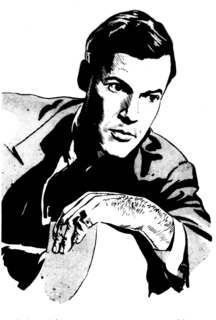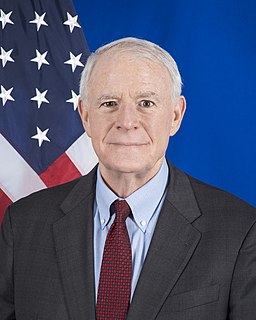A Quote by Glenway Wescott
But let us laugh carelessly like other men. Let us be timid even among fools. Let us knot silence around our throats. For they would surely kill us.
Related Quotes
The Americans say that we are ungrateful-but I ask them for heaven's sake, what should we be grateful to them for-for murdering our fathers and mothers?-Or do they wish us to return thanks to them for chaining and handcuffing us, branding us, cramming fire down our throats, or for keeping us in slavery, and beating us nearly or quite to death to make us work in ignorance and miseries, to support them and their families. They certainly think we are a gang of fools.
Ah! In fact there are two moralities ... The petty one, the conventional one, the one devised by men, that keeps changing and bellows so loudly, making a commotion down here among us, in a perfectly pedestrian way ... But the other one, the eternal one, is all around and above us, like a landscape that surrounds us and the blue sky that gives us light.
We become male automatically because of the Y chromosome and the little magic peanut, but if we are to become men we need the helpof other men--we need our fathers to model for us and then to anoint us, we need our buddies to share the coming-of-age rituals with us and to let us join the team of men, and we need myths of heroes to inspire us and to show us the way.
As we live our human lives, let us be like the water. Let us be conscious of the flow. Let us not forget the great ground of being that draws us on through life. Let us live in a knowing hope, aware that all being is in transition, that all movement is back to the source. Let us treat those around us as reminders of our illusionary individuality. We know that they are us and we are them connected in ways we cannot fathom. Let us grow in compassion for all beings, for they share our journey.
The vault above us is not deaf because the universe is an idiot; the silence is not the heartless silence of an endless and aimless world. Rather the silence around us is a small and pitiful stillness like the prompt stillness of a sick room. We are perhaps permitted tragedy as a sort of merciful comedy, because the frantic energy of divine things would knock us down like a drunken farce. We can take our own tears more lightly than we could take the tremendous levities of the angels. So we sit perhaps in a starry chamber of silence while the laughter of the heavens is too loud for us to hear.
In marriage we have a duty to God, our spuses, the world, and future generations. But we are sinners. A husband and wife need to acknowledge that when the Bible speaks of fools, it is not just speaking about other people, but about them as well. Even the wisest among us has moments of folly. So God gives us spouses to serve as wise friends by praying with and for us, attending church with us, speaking truth, and providing Scripture along with good books and online classes, lectures, and sermons to nourish fruitfulness in our lives.
Our sense of identity is in large measure conferred on us by others in the ways they treat or mistreat us, recognize or ignore us, praise us or punish us. Some people make us timid and shy; others elicit our sex appeal and dominance. In some groups we are made leaders, while in others we are reduced to being followers. We come to live up to or down to the expectations others have of us.
Our father has an even more important function than modeling manhood for us. He is also the authority to let us relax the requirements of the masculine model: if our father accepts us, then that declares us masculine enough to join the company of men. We, in effect, have our diploma in masculinity and can go on to develop other skills.
There are different qualities of silence. There's the silence that sustains us, as women, that nourishes us, the silence where I believe our true voice, our authentic voice, dwells. But there's also the silence that censors us, that tells us what we have to say does not want to be heard, should not be heard, has no value. And that if we speak, it will be at our own peril. This kind of silence is deadly. This kind of silence is deadening to who we are as women. And when a woman is silenced, the world is silenced. When a woman speaks, there is an opening.
The storyteller is deep inside everyone of us. The story-maker is always with us. Let us suppose our world is attacked by war, by the horrors that we all of us easily imagine. Let us suppose floods wash through our cities, the seas rise . . . but the storyteller will be there, for it is our imaginations which shape us, keep us, create us - for good and for ill. It is our stories that will recreate us, when we are torn, hurt, even destroyed. It is the storyteller, the dream-maker, the myth-maker, that is our phoenix, that represents us at our best, and at our most creative.






































